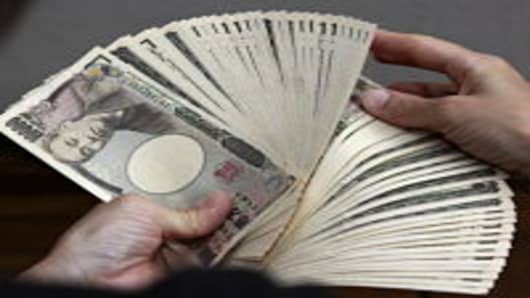The Bank of Japan on Tuesday eased its policy by boosting asset purchases and defined 1 percent consumer inflation as a near-term goal in response to growing calls for more action to help the economy mired in deflation and weighed down by a strong yen.
In a move that surprised markets, the central bank added 10 trillion yen ($130 billion) to its asset buying and lending scheme, under which it buys government and private debt and lends cheap funds against various types of collateral. The entire increase amount will be for purchases of long-term government bonds, the BOJ said.
The BOJ also said it will set consumer inflation of 1 percent as its price goal for the time being, making a clearer commitment to end deflation than before when it defined the level as its "understanding" on long-term price stability.
Ten-year government bond futures jumped and the yen dipped as much as 0.4 percent in response to the central bank's decisions.
Pressure has been mounting in the past weeks on the BOJ to take bolder action and set a Federal Reserve-style explicit inflation target amid criticism from politicians that the central bank was not aggressive enough in its effort to pull the country out from prolonged deflation.
"The Federal Reserve's decision to adopt an inflation target is clearly affecting the BOJ's thinking. The Fed's move has also given ruling and opposition lawmakers reason to pressure the BOJ into adopting an inflation target and easing policy further," said Seiji Adachi, senior economist at Deutsche Securities in Tokyo.
As widely expected, the BOJ left unchanged its key interest rate at a range of zero to 0.1 percent by a unanimous vote.
The BOJ has been under pressure for bolder action from politicians, who may face a snap election later this year, and the government worried the economy may not be robust enough to stomach tax increases proposed to fix stretched public finances.
BOJ Governor Masaaki Shirakawa was grilled in parliament last week by lawmakers threatening to revise the BOJ law to give the government more scope to intervene in monetary policy, while the economics minister urged the bank to explore ways to make its price commitment easier to understand.
The central bank has pledged to keep ultra-low interest rates until an end to deflation is in sight, and defined desirable long-term price growth as consumer inflation of 2 percent or lower with the median for the nine-member board at 1 percent.
It had described this as the board's "understanding" of desirable inflation rather than an explicit price target, for fear of having its hands tied on policy. But this has drawn criticism as too vague compared with the Fed's 2 percent inflation target announced last month.


